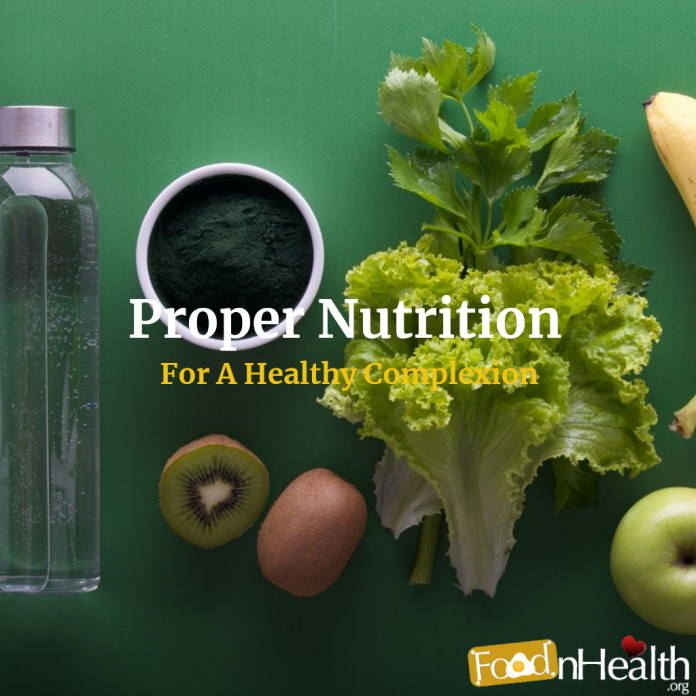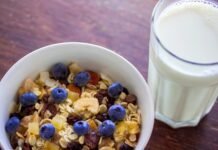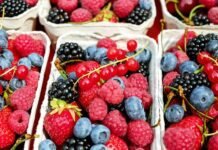It’s no secret that what we eat significantly affects our skin. Our skin is often the first one to react if we eat something that isn’t good for our body and health. So, if you aim at having a healthy complexion, here is what your proper nutrition should look like:
1. Five portions of fruit and vegetables on a daily basis
Both fruit and vegetables contain antioxidants that protect skin from damage caused by free radicals, air pollution and smoking. All of this leads to the appearance of deep wrinkles and age spots. So, pick as many colors as possible when it comes to the choice of fruit and vegetables and make sure you eat them 5 times a day. Ingredients like lutein and beta carotene present in papaya, spinach, carrot, pumpkin and sweet potatoes are powerful when it comes to fighting antioxidants.
2. Fatty fish
If you’re not a fan of fatty fish, well, think again. Fatty fish like salmon contains omega-3 fatty acids that reduce skin inflammation and also hydrates skin. Other types like mackerel and herring are also rich with vitamin E, zinc and protein, providing skin hydration. In short, fatty fish contains many ingredients necessary for a healthy skin complexion, free of inflammation and wrinkles.
3. Avoid sugar
You will definitely have benefits from avoiding sugar if you have acne-prone skin. Low-glycemic diets, meaning they are free of refined sugary foods, will give positive results not just for acne-prone skin but for any other type, too.
4. More vitamin C
Being a super antioxidant, vitamin C needs to be on your daily menu. Your immune system needs it but also your skin, as it creates radiant skin and removes blemishes. The best sources of vitamin C include broccoli, blueberries, oranges, papaya, sweet potatoes and strawberries. In order for our body to produce collagen that will make our skin fresher, you need your daily intake of vitamin C.
5. Low-fat dairy products
Vitamin A is one of the essential components of healthy skin. The best source of this vitamin is low-fat dairy products like low-fat yogurt. It also contains acidophilus, a bacteria that are beneficial for your intestinal health, which could also have positive effects on your skin. Even though carrots are also a great source of vitamin A, the fact that many low-fat dairy products also help our indigestion is the reason why you should eat and drink more of them.
6. Selenium intake
Another powerful antioxidant, selenium, works best when combined with vitamins E and C. It boosts your immune system and protects your skin from sun damage, age spots and skin cancer. Environmental exposure is especially significant in countries like Australia, where professionals from a cosmetic clinic in Canberra explain how and why skin deteriorates with age. They state that extrinsic factors like environmental exposure will have an effect on the state of your skin. So, Brazil nuts, shellfish, eggs, tomatoes and broccoli are one of the foods you need to eat in order to fight environmental effects on your skin.
7. Drink plenty of water
Your skin needs water in order to stay flexible. Even mild dehydration shows on your skin, which then looks dry and dull. All fluids add to the overall amount of water, like tea, juices and coffee, but water is the best choice. Always keep a bottle of water close to you to remind yourself that you need to drink it. Of course, herbal teas, fruit and vegetables also contribute to the amount of water your body gets, especially due to minerals in them that enhance the hydration of your body. Excessive alcohol consumption and smoking will have the opposite effect, causing your skin to dry and age prematurely.
8. Phyto-estrogens
They are natural chemicals present in plant foods. Their structure is very similar to the female sex hormone estrogen and they help our hormone balance. There are several types of them and they are most present in foods like soya bean products, tofu, whole grains and linseed. If you want to have a balanced diet, don’t neglect these foods. A hormonal balance will help in maintaining healthy skin complexion.
9. Green tea
Everybody knows that green tea is an excellent antioxidant. Green tea polyphenols help to create elastic, smooth skin and to reduce damage due to UV radiation. Catechins in it improve blood flow and oxygen that reaches the skin, making it plumper and more radiant.
10. Eating peels
Most of us peel fruit we eat, including apples, pears and citrus fruits like orange or lemon. However, people who eat peel have a 33% lower risk of developing squamous cell carcinoma. Limonene, a compound present in the peels of the citrus fruits gives incredibly strong protection from the UV radiation.
Final comment
Radiant, healthy skin complexion is not just a simple matter of genetics. You can do so much when it comes to the appearance of your skin. A balanced diet is a way not only to have healthy skin but a healthy, body, too. By following these tips, you will definitely feel better, which will also be visible on your skin.


























